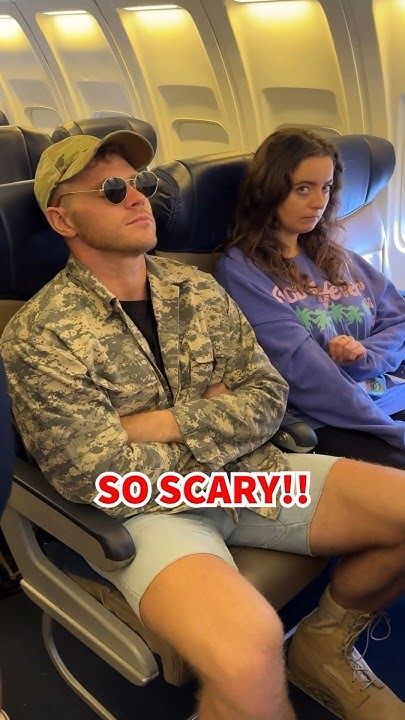I was sitting in seat 23B on a late-night flight from Phoenix to Newark, halfway through the trip, when something caught my eye. The woman next to me, maybe in her early thirties with brown hair pulled back loosely, reached for her drink, and I noticed her hand tremble ever so slightly.

At first, it seemed like nothing, just nerves or turbulence, but as I glanced over, there was something in her posture that felt wrong. She hadn’t spoken once to the man sitting beside her the entire flight, yet his presence was suffocating. He wore a camouflage jacket, mirrored aviator sunglasses—which made no sense on a red-eye—and a trucker hat pulled low over his forehead. He hadn’t said a word either, but everything about him screamed control, ownership, like he didn’t want her to interact with anyone around them. My gut tightened as I stole another look. That’s when I saw it.
She reached for her cup, but instead of grabbing it, she slowly curled her thumb into her palm and wrapped her fingers around it, her movement deliberate, calculated. Her eyes flicked to mine for half a second, and my pulse spiked. I knew that signal. I’d seen it online—the silent hand sign for “I need help.” A rush of adrenaline hit me, my body reacting before my brain caught up. But doubt crept in just as fast. What if I misread it? What if she was just anxious, fidgeting like nervous flyers do? No one else seemed to notice; the flight attendants passed by, smiling, unaware.
I had a few seconds to decide—speak up and risk making a scene or stay quiet and risk leaving her in danger. My voice shook as I leaned toward the flight attendant passing by. “I think she’s signaling for help,” I whispered. “Please, can you check?” The attendant’s cheerful expression vanished, replaced by sharp focus. She nodded quickly and walked toward the cockpit. That’s when the man beside her leaned forward slowly, turning to look at me with a smile that never touched his eyes.
“Think you’re confused, pal,” he said in a low, gravelly voice. “My wife’s just tired, that’s all.” The way he said “wife” made my skin crawl. It wasn’t affectionate; it sounded like a claim of ownership, a warning to stay out of his business. The woman stayed silent, her gaze fixed on the tray table in front of her, shoulders tense. My heart pounded, but I said nothing more. His eyes stayed on me for a long moment, daring me to push further. Minutes later, the head flight attendant returned with two crew members, calm but firm. They asked the man to step into the back of the plane for a few questions.
He laughed, like it was a misunderstanding, but there was no humor in his voice. “Sure,” he said, standing slowly, a forced grin plastered on his face. As he passed me, he muttered under his breath, “People need to mind their damn business.” Once he was gone, the woman finally let out a shaky breath and leaned ever so slightly toward me. “Thank you,” she whispered. That’s when I saw the faint red marks around her wrists, the kind you get from being grabbed too hard or restrained for too long. Any lingering doubt I had evaporated. Later, one of the crew quietly told me the pilot had contacted authorities.
There was an alert out of Arizona for a missing woman matching her description. The man wasn’t her husband, not even close. They’d met online, she’d believed his story until it was too late, and he’d used a fake name to book the ticket. Nobody knew exactly what he had planned next. But through all of it, she remembered the one thing that could save her—the hand signal. When we landed in Newark, two officers boarded before anyone else moved. They escorted her off first, then returned for him, handcuffing him in front of the entire plane. As they walked her away, she turned just once, met my eyes, and gave me a small nod that said more than words ever could.
I didn’t sleep that night. I kept replaying it in my head, thinking about what would’ve happened if I hadn’t noticed, if I’d convinced myself it was none of my business like so many people do. We’re taught to stay out of other people’s problems, to avoid trouble, but sometimes, someone desperately needs you to step in quietly, bravely, even awkwardly. Her signal wasn’t loud or dramatic, but it saved her life. If you ever see something that feels wrong, even a small sign, speak up. You might be the only chance someone has.





